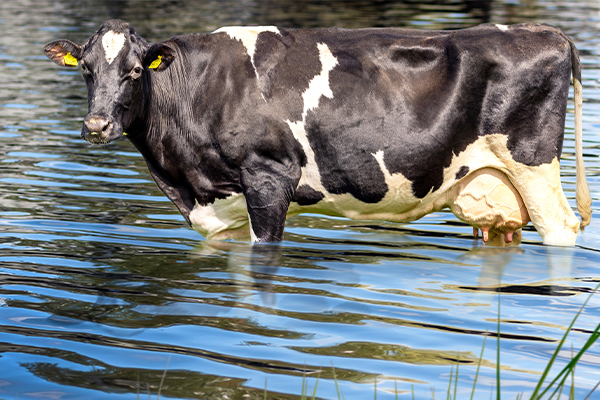
Prevent production losses during heat stress with these 4 nutritional tips
We have had several warm days, with temperatures exceeding 25 degrees Celsius. Although the cooler nights and relatively low humidity levels (60%) have probably not yet led to significant production losses, heat stress does have a direct impact on feed intake and milk production. In addition, cow health comes under pressure. It is therefore essential to ensure tasty feed and reduce heating of the diet in addition to cooling the animals and clean drinking water. In this article, you will find 4 valuable nutritional tips to be well prepared for heat stress.

Tip 1: Prevent 1.4 kg production drop with Selko-TMR
Heating of the cow’s feed is an important but often invisible cost item. Higher temperatures promote the growth of yeasts, bacteria and moulds at the cutting surface of the silage pit or at the feed fence. This easily results in dry matter losses of 5%, mainly of energy-rich sugars and readily available protein. A 5% dry matter loss equates to about 12 cents loss per cow per day.
Inhibiting heating of the diet helps to maintain milk production. A study in the Netherlands conducted from July to September 2022 showed that cows fed organic acid blend Selko-TMR produced up to 1.4 kg extra milk (see figure 1). The major advantage of Selko-TMR over other preservatives is that its higher pH makes it less aggressive and corrosive and therefore safer to use. This is recommended for your employees, cooperating family members and, of course, for yourself!
Why Selko®-TMR?
- Preservation of feed value
- Better spread feed intake throughout the day
- Less feed residuals
- More milk
- Labour and fuel savings by not having to feed twice a day
- Safe for your mixer wagon

Figure 1. Milk production in study on the effect of adding 2L/tonne Selko TMR to the mixed ration. The trial ran from mid-July to early September 2022.
Tip 2: Prevent rumen acidosis with Levucell SC
The rumen also deserves extra attention during heat stress. Heat stress can lead to more fluctuations in rumen pH. Levucell SC, a live yeast, has shown positive effects during heat stress. It supports stable rumen conditions by consuming oxygen, which enters the rumen during eating and rumination. An extensive study in Florida at high temperatures (Perdomo et al., 2020) showed that daily administration of 1 g Levucell SC 20 resulted in significant improvements in fat and protein corrected milk (FPCM) yield (+2.0 kg/cow/day) and feed efficiency (+8%). In addition, a change in feeding behaviour was observed, manifested as longer chewing time per kg dry matter (+14%). This enabled the cow to get more buffer from saliva into the rumen, resulting in improved protein and fibre (NDF) digestibility of 8% and 16%, respectively.
Tip 3: Support intestinal health with Selko LactiBute
An even less known effect of heat stress is the negative effect on intestinal health of cows (Baumgard & Rhoads, 2013; Koch et al., 2019). Numerous small inflammatory responses cost the cow a lot of energy and protein, and interfere with nutrient absorption. Feeding Selko LactiBute, a rumen-bypass prebiotic, supports intestinal health by modifying the gut microbiome resulting in an increase of 1 kg FPCM on average. Field experiences during the summer period showed more persistent fat and protein contents in a test in Italy, resulting in 1.8 kg more FPCM (see figure 2) and better milk production on a farm in Flanders (see figure 3) compared to previous years.

Figure 2. Effect of feeding LactiBute during summer 2021 on a farm in Italy. Figure shows fat and protein contents of milk in 2020 vs 2021.

Figure 3. Trend of BSK (standardized milk production value of each cow to the 50th day of the third lactation) when using LactiBute during summer 2022 on a dairy farm in Flanders. LactiBute was fed from May 2022, starting 2 weeks before milk sampling in May.
Tip 4: Feed rumen-resistant fats
Increasing milk (fat) production can be easily achieved by adding rumen bypass fats to the ration. Fats have a high energy density and can increase energy levels in the ration. However, pay attention to the type of fatty acid, as this affects the cow's response. Trouw Nutrition offers two different rumen stable fats: Maxfat 80, consisting of 80% fatty acid C16:0, and Maxfat CS, a calcium soap high in C18:1 fatty acids.

Want more background information or advice on heat stress or the products mentioned? Please contact Eric van der Wijst
